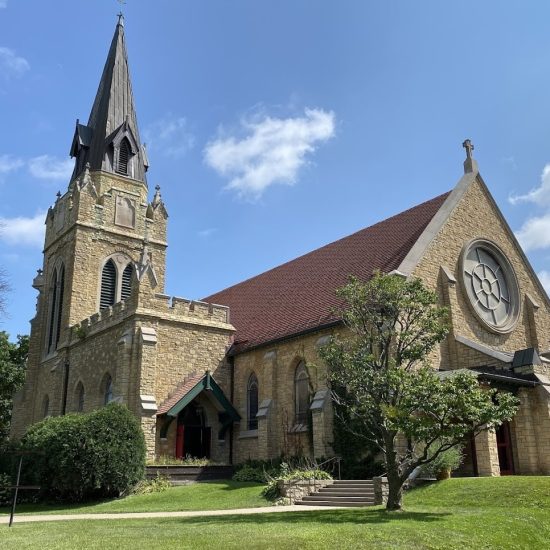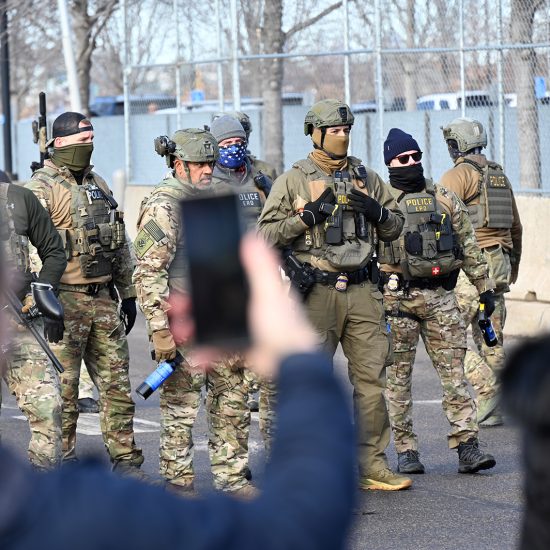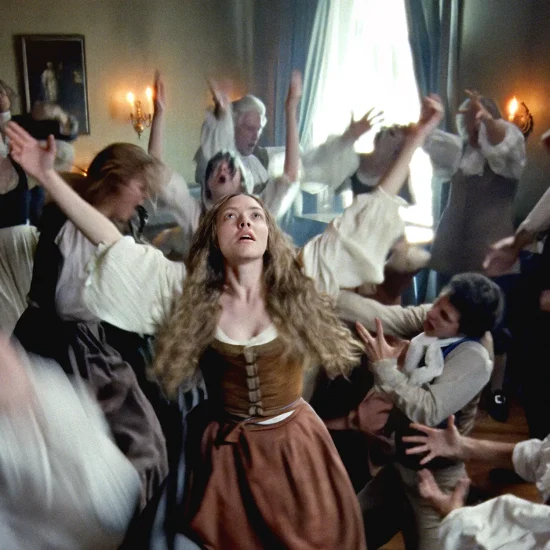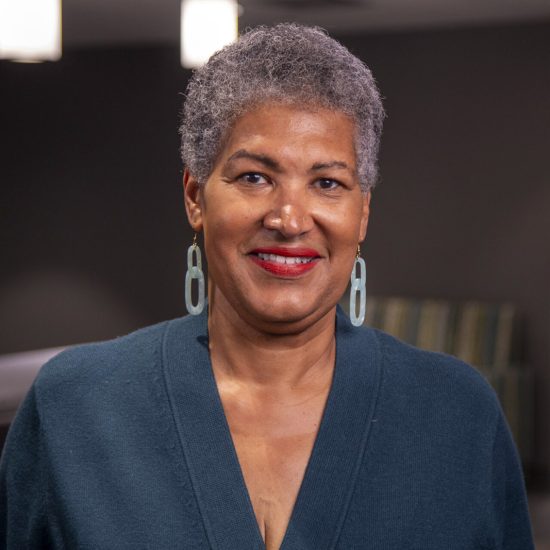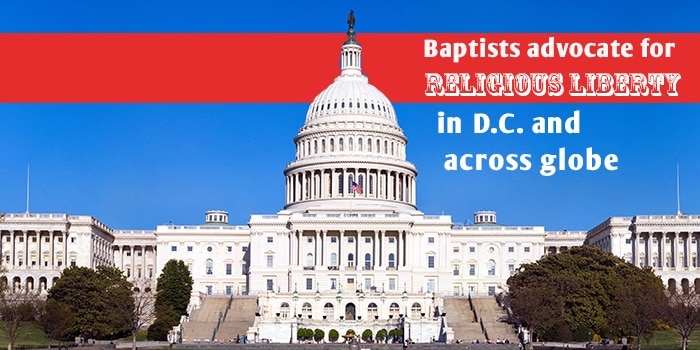
When Brent Walker arrives at work, he can look out at the U.S. Capitol and the U.S. Supreme Court building. He often finds himself heading over to those two buildings, as well as the White House and other government buildings in Washington, D.C.
Walker serves as the executive director of the Baptist Joint Committee for Religious Liberty (BJC), making him a key voice for Baptists in the nation’s capital. Working for the BJC for 27 years, Walker remains passionate about religious liberty and the heritage Baptists have in that area.
“Religious liberty has always been precious for Baptists,” Walker said. “We were born in a fight for religious liberty 400-plus years ago. And we’ve been at it ever since. So it really is in our DNA. It should inform our thinking — even now when in many parts of our country we’re in the majority.”
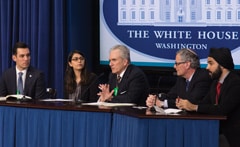 Brent Walker ((center) speaks on a panel with other faith leaders at a White House convening on religious tolerance, held in 2015. (BJC photo)“It’s not just for me, it’s for everybody,” he added. “’Religious liberty for me but not for thee’ is a foreign concept to the Baptist heritage. If anyone’s religious liberty is denied, everyone’s — including ours — is threatened.”
Brent Walker ((center) speaks on a panel with other faith leaders at a White House convening on religious tolerance, held in 2015. (BJC photo)“It’s not just for me, it’s for everybody,” he added. “’Religious liberty for me but not for thee’ is a foreign concept to the Baptist heritage. If anyone’s religious liberty is denied, everyone’s — including ours — is threatened.”
The BJC, now celebrating its 80th year, represents 15 Baptist bodies across the nation to advocate and educate on religious liberty. Member bodies include American Baptist Churches, USA; Cooperative Baptist Fellowship; and Churchnet.
BJC staff members file briefs with the Supreme Court, pressure congressional members on legislation, offer testimony in governmental hearings, work with the White House and governmental agencies and educate Baptists and others on the importance of religious liberty and “how separation of church and state helps protect religious liberty for all.”
As Walker considers recent trends in religious liberty legislation and court decisions, he sees a mixed picture. In some areas — like protecting church autonomy and free exercise — he generally likes what he sees.
In other areas, especially with the “no establishment” clause, he remains worried.
“I don’t think we understand the importance of not having government promote religion,” he said. “The [Supreme] Court has gotten pretty squishy.”
“The Baptist Joint Committee has taken the position the government shouldn’t subsidize churches — period,” he added. “We stand up for historic Baptist principles and First Amendment principles.”
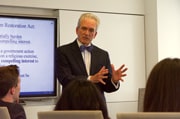 Brent Walker speaks to students at Samford University. (BJC photo)Walker also worries people have “sometimes gone too far at the state level” by passing laws that “tilt the playing field” too much in one direction. He emphasized the need for “careful balancing” and looking for “a both/and solution” when considering the rights of various peoples in society.
Brent Walker speaks to students at Samford University. (BJC photo)Walker also worries people have “sometimes gone too far at the state level” by passing laws that “tilt the playing field” too much in one direction. He emphasized the need for “careful balancing” and looking for “a both/and solution” when considering the rights of various peoples in society.
One of the ways the BJC works to educate about religious liberty is through its annual Walter B. and Kay W. Shurden Lectures on Religious Liberty and Separation of Church and State.
Molly Marshall, president of Central Theological Seminary in Shawnee, Kan., gave the 2016 lectures on the campus of Bethel College in St. Paul, Minn. Marshall believes that in the U.S. “we’re going through a seismic shift in religious ethos,” which sparks “fear of religious pluralism.” Even in a pluralistic society she urges Baptists to work to “protect the religious liberty of all.”
“Religious liberty is an essential part of the freedom and the dignity of humans,” Marshall explained. “As Christians, we must learn to live out our faith with humility and with generosity.”
Marshall fears the current political campaign has not been helpful, noting “reckless speech in a time of growing religious pluralism” only further “stokes fear.”
“The shrill rhetoric of public discourse does not serve the common good,” she added. “As a Baptist, I get very nervous when the political realm speaks too much about religion.”
International religious liberty
In addition to considering religious liberty issues in the United States, Marshall also sees the importance of U.S. Baptists caring about religious liberty elsewhere.
 Molly MarshallShe particularly points to the nation of Myanmar, where Central has a partnership and is thus a place she frequently visits.
Molly MarshallShe particularly points to the nation of Myanmar, where Central has a partnership and is thus a place she frequently visits.
Christians in Myanmar represent a minority and live in a land where the government favors another religion, Buddhism.
Marshall noted several problematic laws, including requiring people converting religion to get approval, making it difficult for Buddhist women to marry outside the faith and obstacles to building religious buildings.
“Baptists have made religious liberty a hallmark of our faith and it matters that we stand with other Baptists, especially those in Myanmar who face severe constriction of free exercise,” she argued.
Elijah Brown agrees with Marshall’s plea. He serves as the executive vice president of the 21st Century Wilberforce Initiative, an organization that focuses on issues of international persecution and religious liberty.
Brown noted that over 77 percent of the world — or more than 5 billion people — “continue to live in contexts of religious discrimination, marginalization and persecution.”
Places where the 21st Century Wilberforce Initiative has worked recently include Iraq, Nigeria, Hong Kong and Ethiopia.
“As the most globally diffuse religion, Christians are the most persecuted faith community worldwide and face restriction, discrimination or persecution in over 60 countries,” he added. “On average 20 Christians are martyred every day.”
Brown and his organization do not merely advocate for Christians, but also work to advance religious liberty rights for other persecuted religious groups.
“Practically from the beginning, Baptists have championed religious freedom and that religious freedom applied not just to Christians, but for all people in all places of all religions,” he said.
Brown also sees religious liberty as beneficial to society overall.
“Religious freedom is vital to building democratic societies,” he explained. “Human rights and religious freedom allows people to exchange ideas and to build society by persuasion rather than by manipulation or force.
“Religious freedom builds a deep respect for human dignity and the value of every individual’s conscience,” he added. “Where religious freedom and human rights are emphasized, the temptation to extremism is brought down.”
See also:



